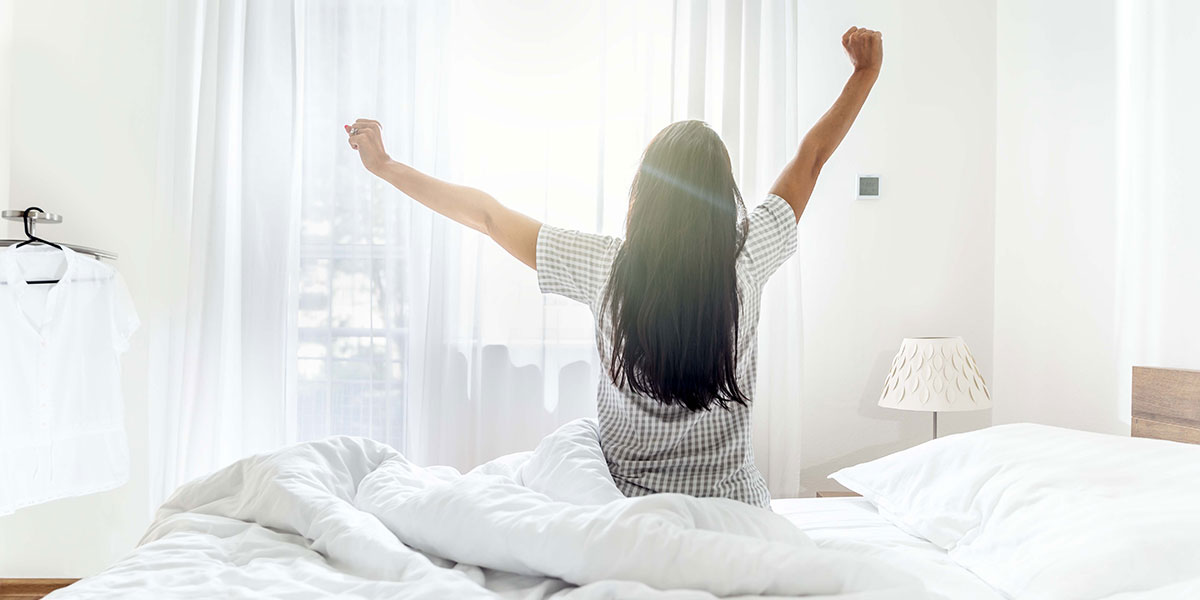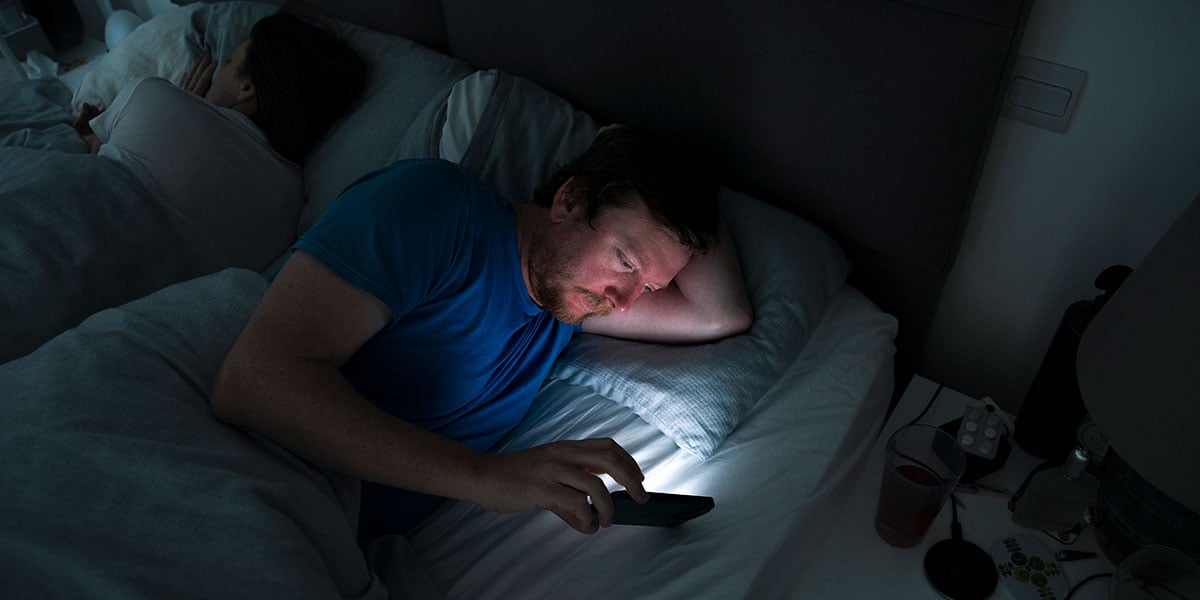Tired But Can’t Sleep? Your Primary Care Doctor Can Help

If you have trouble sleeping, you’re not alone. Around 35% of adults have a sleep disorder. If you head to bed tired at night but can’t go to sleep — including not being able to fall asleep, restless sleep, waking up multiple times during the night, not being able to stay asleep as long as you’d like, and/or waking up early and not being able to fall back to sleep — you may be suffering from insomnia, the medical term for sleep deprivation.
The negative effects of insomnia go beyond sleep, including health issues like an increased risk of depression, diabetes, hypertension, heart attack and stroke. Insomnia can also negatively impact your mood and overall quality of life. Because it increases the likelihood of injuries and accidents, especially when driving, it can also harm other people.
There are steps you can take to overcome sleeplessness, and your doctor can work with you to help you get your Zzzs. Read on to discover what can cause sleeplessness, signs you’re not getting enough quality rest and treatments to help get your sleep back on track.
The importance of sleep for health
The amount of sleep we need varies from person to person and can change with age. On average, most experts still recommend we get seven to eight hours of sleep each night. , though two 2023 studies found that sleeping less isn’t necessarily harmful to your health, as long as you also get quality daytime naps.
Sleeping for eight hours a night means we spend a third of our lives asleep. While we might prefer to stay productive or spend more time awake with family and friends, each of our body systems needs sleep to function healthily for us to survive — it’s why sleep is considered one of the three pillars of health, along with nutrition and movement.
Our respiratory, cardiovascular, digestive, urinary, reproductive, nervous, muscular, endocrine, lymphatic systems and even our skeletal system all depend on sleep. Research has also found that while we sleep, the brain uses a drainage system to rid our body of toxins. Lack of sleep also affects our metabolism and can result in either weight loss or weight gain.
Sleep and mental health
A large body of research has linked inadequate sleep to poor mental health. As recently as 2021, researchers for the National Institute of Mental Health (NIMH) and Centers for Disease Control (CDC) found that people suffering from sleep deprivation (defined as sleeping fewer than 6 hours any given night) were 2.5 times more likely to have frequent mental distress.
Poor sleep can also increase feelings of stress, anxiety and depression, which in turn can result in poor sleep, creating a vicious cycle. Sleep researchers at Johns Hopkins Medicine report that people suffering from insomnia are at a tenfold higher risk of developing depression, and 75 percent of people with depression have difficulty falling and staying asleep. This is because restorative slow-wave sleep – considered the deepest sleep state – is when our major body systems recalibrate, including our hormones. Not getting enough can leave us more vulnerable to depressive episodes, both short and long term. Not being able to fall asleep can also greatly impact REM sleep, the rapid eye movement cycle that occurs 70-90 minutes after falling asleep and is considered critical for our emotional and mental health.
At the very least, not getting enough quality sleep can make us cranky, irritable, angry, tearful, and unable to focus, any of which can have a meaningful negative impact on our ability to learn and function in our jobs and daily life.
Sleeping too much
When you sleep for 10 hours or more, have difficulty waking up and are still sleepy throughout the day, it is called idiopathic hypersomnia. An estimated 5% of the population suffers from hypersomnia; women are more likely to be affected than men, and it is most common in young adults ages 17 to 24. Despite ongoing research, the cause remains a mystery, but it’s thought to relate to potential malfunctioning of the roles of cerebrospinal fluid and neurotransmitters in the brain.
There’s also a possible genetic component, as a family history of hypersomnia is present in 39% of cases studied. In severe cases, in addition to extreme ongoing sleepiness, restlessness and decreased energy, hypersomnia can cause slurred speech and slow thinking, memory problems, headaches, loss of appetite and hallucinations.
Occasional sleep periods lasting longer than 10 hours may be chalked up to other factors like shift work or social life. Ongoing drowsiness after consistent sleep of 7 hours or more may be a sign of other conditions such as sleep apnea (interrupting your sleep) or diabetes (high blood sugar can cause fatigue).
Fast facts about sleep disorders
- More than one third of people in the U.S. sleep fewer than 7 hours on average a night.
- 35% of U.S. adults suffer from a sleep disorder; close to two-thirds report occasionally experiencing insomnia symptoms; and 10-15% experience chronic insomnia lasting multiple months.
- A 2019 study reports that 75% of older adults experience insomnia symptoms, and incidences of multiple psychiatric and physical disorders are higher in older adults with insomnia.
- Driving drowsy is responsible for more than 6,000 auto fatalities each year.
- Almost 70% of people who snore have been diagnosed with obstructive sleep apnea (OSA), a condition when your breathing stops and starts while sleeping.
A 10% increase in body weight can make you six times more susceptible for having OSA.

All about insomnia
Insomnia is a common sleep disorder defined as being unable to sleep even when you have the time and environment to do so, typically at night. It helps to first understand the stages of sleep and what our body is doing and why, as any interruptions to the different levels of sleep our body needs can result in a sleep disorder.
The first stage of sleep is called NREM, non-rapid eye movement sleep, when our brain waves slow down. This lasts for 70 to 90 minutes, after which our brain picks up activity again. This is called REM sleep, which stands for rapid eye movement, when our eyes move back and forth quickly, and it’s when most dreams occur. It takes about 90 minutes for the brain and body to cycle between NREM and REM stage sleep, which happens multiple times each night. Sleep disorders can cause or be a result of disruptions interfering with this process.
Sleep disorder risk factors include:
- Changes in schedule and regular routine, especially in work shifts.
- Taking too many long naps during the day.
- Change of environment: For example, more or less noise and light than you’re used to or uncomfortably low or high temperatures.
- Age: Insomnia tends to increase as we get older.
- Lifestyle changes, including too little daytime physical activity; watching TV or using blue light-emitting electronics right before bedtime; sleep interruptions (such as having a baby); consuming caffeine, alcohol or recreational drugs.
Symptoms & warning signs:
- If you regularly experience any of the following, you may be suffering from insomnia:
- Difficulty falling asleep at night
- Restless sleep and waking up multiple times during the night
- Waking up too early and not being able to fall back asleep
- Not feeling well-rested after sleeping
- Sleepiness and tiredness throughout the day
- Depression, anxiety or irritability
- Difficulty paying attention or remembering
- Increased amount of accidents or making mistakes
- Worrying about sleep
If insomnia symptoms are negatively impacting your ability to function in your daily life or work, it might be wise to make an appointment to chat with your doctor. He or she can help get to the bottom of what may be causing your inability to sleep, prescribe sleep medications if necessary and may refer you to a sleep specialist for assessment and testing.
Sleep disorder tests & diagnosis:
If you’re experiencing symptoms of a sleep disorder, your doctor may order a polysomnography (commonly known as a sleep study) to check for specific symptoms causing your sleeplessness. Signs include your breathing suddenly stopping while sleeping (obstructive sleep apnea), flexing and stretching your legs and feet in the night (restless leg syndrome), being overwhelmed with tiredness and suddenly and uncontrollably falling asleep during the day (narcolepsy), acting out dreams (REM sleep behavior disorder), sleepwalking or rhythmic movements while sleeping.
A sleep study monitors your brain wave activity, heart rate and breathing while you sleep, checks the level of oxygen in your blood and records the movement of your limbs and eyes. It’s the most common insomnia test and is typically performed at a sleep clinic or by a specialist. A sleep study usually involves being hooked up to various tracking devices, including an EEG (electroencephalogram) that tracks brain wave activity during the different stages of sleep.
There are also home sleep study devices you can purchase directly online or from a pharmacy retailer (it’s recommended you look for one that is FDA-approved). If the home device is prescribed by a healthcare provider, your health insurer may cover all or part of the cost. These devices typically use combinations of sensors to track and record your heart rate, oxygen levels, airflow and breathing rate, and are commonly used to diagnose obstructive sleep apnea (OSA), a disorder that causes your breathing to suddenly stop and start while sleeping.
In addition, you may be asked to keep a sleep journal, where you will keep a written record of how long it took you to fall asleep, how long you slept, whether you felt rested \when you woke up, and any notable details of your day, like what you did and the environment you were in.
Understanding what causes sleep apnea:
Sleep apnea is a relatively common condition when your breathing suddenly stops then restarts multiple times when you’re sleeping, which can prevent your body from getting the oxygen it needs. Per U.S. Census data, more than 70 million men and more than 50 million women snore; up to 70% of snorers are diagnosed with sleep apnea.
There are two different types of sleep apnea:
Obstructive sleep apnea (OSA) is the most common, and occurs when the upper airway becomes blocked and reduces or completely restricts airflow, reducing oxygen intake. Snoring or gasping when you sleep are the common symptoms, and risk factors include large tonsils, obesity or hormone level changes.
Central sleep apnea (CSA) happens when the brain stops sending signals that tell your body to breathe. This rarer form is often a result of congestive heart failure, a stroke or mini-stroke.
Sleep apnea warning signs & risk factors:
Warning signs of sleep apnea include:
- Loud snoring
- Waking in the night choking and gasping
- Observation by another person of periods during sleeping when you stop breathing
- Waking up with a headache, dry throat or dry mouth
- Frequent and excessive sleepiness during the day
- Irritability or depression
- Trouble focusing
Risk factors include both lifestyle habits and genetics:
Obesity: due to increased fat in the neck area that can constrict the upper airway.
Smoking: can cause inflammation of the upper airway.
Alcohol: can cause the mouth and throat to relax, closing the upper airway.
Having a large tongue or tonsils or a thick neck: these can narrow or block your upper airway while you sleep.
Endocrine or hormone disorders: these can affect the shape and size of your tongue, face and airway. High levels of insulin and low levels of thyroid or growth hormones can also increase risk.
Heart or kidney failure: this can increase fluid in the neck area and cause upper airway restrictions or blockages.
Age and gender: sleep apnea risk increases as we age. when fatty deposits can build up in the neck and restrict the airway. Men are more at risk than women.
Genetics and family history: Genetics defines the shape of the face, skull and airways. Certain inherited deformities and anomalies of these body parts can increase apnea risk.
Sleep apnea-related disorders:
Research has linked sleep apnea with an increased risk of diabetes, high blood pressure, heart disease and stroke – and potentially even some cancers. Studies have also long established a link to diabetes causing increased risk of sleep apnea. A 2008 study in the journal Chest found that the incidence of sleep apnea is 48% of people with type 2 diabetes suffer from sleep apnea, and 86% of type 2 diabetics with obesity. This in turn increases the risk of cardiovascular disease.
A 2012 study concluded that sleep apnea frequently reduces cardiac output and results in high blood pressure, also increasing the risk of cardiovascular disease, heart attack and stroke. And while there is not as much evidence and research continues, another 2012 study found that people suffering from sleep apnea endured a higher instance of different cancers.
Sleep apnea tests & diagnosis:
As with an insomnia test, if you have signs of sleep apnea your doctor may refer you to a sleep clinic to undergo a nocturnal polysomnography, during which you’re hooked up to devices that track and measure disruptions in your breathing and oxygen level intake. Your doctor will also likely take a sleep history and ask you to provide details of your symptoms and frequency with the help of someone who shares your bed or household and who can observe your breathing pattern and note disruptions.
Similarly, a home sleep study device can track your airflow, breathing patterns and oxygen intake. Your healthcare provider may also have you see an ear, nose and throat specialist (ENT) to assess the physical structure of your neck, throat and airways to rule out blockages or obstructions.
What is sleep hygiene?
Sleep hygiene essentially means good sleep habits, which encompass your sleep-related behavior and routine, as well as the environment in which you sleep. Proper sleep hygiene can go a long way toward achieving consistent, quality sleep. The “five” principles of good sleep hygiene are:
- Value: First, we need to understand and acknowledge that sleep is fundamental to living, that our body needs quality sleep time to rejuvenate and regenerate critical body system functions, and understand that the quality of our physical, mental and emotional wellbeing during the day depends on good sleep.
- Prioritize: We must take sleep seriously and take action with routine steps to create a schedule and environment conducive to sleeping well.
- Personalize: We need to understand and embrace our own individual sleep needs and rhythm: how much sleep we ideally need and when, whether we’re a night owl or an early-to-bed bird, what environment we best sleep well in, and create surroundings that support healthy sleep.
- Trust: We need to have faith in our body to define our sleep needs instead of forcing sleep on our body. Once we understand our personal sleep needs and create a supportive sleep window and space for it, it’s about letting our body and mind lead the way into quality slumber.
- Protect: We need to remove obstructions that impede our brain and body’s ability to let natural tiredness and sleep occur. Watching TV and scrolling on our phone or tech tablet when we go to bed means we’re not protecting what our body needs to induce sleep. It’s recommended to have a regular wind-down period and routine during which we turn off all technology, avoid caffeine and alcohol, and let our body and brain slow down to drift into slumber.
 Tips for getting a good night’s sleep
Tips for getting a good night’s sleep
Exercise regularly: Multiple research has shown that physical activity up to three hours before bed helps increase sleep time and quality.
Turn off technology: The blue light emitted by TVs, phones and tablets interrupts our internal clock, so try and develop a tech-free way to wind down quietly before bedtime.
Turn off harsh lights or leave a glowing nightlight on if you sleep better when not in total darkness, and set your room temperature to 65 degrees, which research shows supports sleep best.
Practice mindfulness: Before bedtime, slow down the end of your day intentionally. Try deep breathing, meditation or yoga stretches, or take a hot bath or shower to relax. When you transition to a cooler bedroom, it helps your body temperature drop which helps your body naturally feel sleepy.
Stop eating and drinking earlier: Avoid drinking lots of fluid, caffeine or alcohol and eating large meals that can induce heartburn before bedtime. Instead, sip a chamomile herbal tea to help you relax.
Don’t fight sleep: If you’re still awake 20 minutes after turning off the light, get up and do something quiet and relaxing like reading a book or meditating to help you get sleepy again.
Count sheep: It helps many people power down their brain by focusing on just one thing while consciously taking long, deep breaths.
Keep your worries in check: If your mind is racing at bedtime, your brain will fight sleep. Try journaling your worries away earlier in the day and creating to-do lists of solutions.
Sleep and alcohol consumption
Alcohol is a sedative. People who drink alcohol in the evening before bed often fall asleep quickly but experience short or restless sleep time. This is because alcohol interferes with the sleep cycle stages, resulting in shorter, lower quality sleep. Alcohol particularly interferes with REM sleep, the deepest sleep stage which naturally starts its first cycle about 90 minutes after falling asleep. Drinking alcohol increases the suppression of REM sleep, which results in throwing off the natural rhythm of the repeating sleep cycle stages, interfering with the body’s ability to perform its system resets during sleep.
This means after just a few hours of sleep, you may wake up and not be able to get back to sleep, so your body is not getting enough quality slumber to keep you healthy. Alcohol has also been shown to increase the risk of sleep apnea by overly relaxing the tongue and mouth, which can block the upper airway, restricting oxygen flow and causing breathing to stop.
Medical treatment options for sleep disorders
If you have signs of a sleep disorder, your doctor may first recommend taking melatonin. Melatonin is a hormone naturally produced by the brain in response to darkness that helps with the timing of the body’s 24-hour internal clock known as our circadian rhythm. Our melatonin production increases a couple of hours before bedtime when lights are typically dimmer, which helps this hormone do its job inducing sleep. For mild insomnia, taking a melatonin supplement may help. According to a 2012 nationwide Centers for Disease Control Survey, three million Americans take a melatonin sleep aid.
If taking melatonin isn’t effective, your doctor may prescribe a sleep medication like Ambien or Trazadone. These are sleep-inducing sedatives known as hypnotics that adjust chemicals in the brains of people who have trouble sleeping. As with many drugs, they can cause a variety of side effects, in Ambien’s case ranging from mild dizziness to suicidal thoughts.
How to talk to your doctor about sleep and sleep disorders
Because poor sleep can be related to potentially serious health issues like sleep apnea, it can be scary to bring up sleep issues with your doctors. It can be intimidating to bring up sensitive topics that may be related to poor sleep, like weight, lack of exercise, alcohol use and smoking with our doctors because they hold a position of authority over us. Taking time to prepare before your appointment can help build your confidence and ensure you cover everything you need to. Here are some tips:
Be completely honest with your doctor
Sometimes, it’s tempting to be less than truthful with our doctors when it comes to fraught topics like diet, exercise and weight. It’s understandable to feel embarrassed or even guilty if you struggle with things like obesity, binge eating or addiction.
Smoking, obesity and lack of exercise are all risk factors for insomnia and other sleep disorders, so it is important to tell your doctor if you struggle with any of them (and you won’t be their first patient to struggle with these!). You can also communicate to your doctor that you are anxious or embarrassed about these topics, and let them know that you could use reassurance.
Make a list of your questions and concerns
It’s easy to forget important questions at the doctor, especially if your appointment is short or rushed. A simple solution is to write out your questions and concerns ahead of time. You could even keep a list on your phone or a pocket notebook and add to it whenever you think of something else you want to bring up.
If you are planning to make (or have already made) major lifestyle changes, it’s recommended that you check with your doctor to ensure these changes are safe and appropriate for you. Good general questions to ask include:
- What steps do you recommend for managing my insomnia?
- Do I need a sleep study?
- Do you have patients who successfully treated their insomnia or sleep apnea?
- Is there a sleep medication I should try?
- Are there sleep-related books, podcasts or literature I should check out?
- What lifestyle changes do you recommend?
Bring a spouse or trusted friend.
Not everyone knows that you are allowed to bring someone with you when you go to the doctor. Having a confidante by your side can make you feel more secure and help you remember what you want to talk about with your doctor. It also shows your doctor that you have a strong support system, and research has shown that strong social and emotional support are associated with better health.
Take notes
Doctor’s appointments can be overwhelming. In order to remember all of your doctor’s recommendations, it can be helpful to take notes during your appointment. If you bring someone with you, you can ask them to take notes for you. You should also get a visit summary from your doctor after each appointment. If you are not sure how to view this summary, ask your doctor or a member of your doctor’s front desk staff.
If you’re having trouble sleeping, there are many steps you can take to help improve your ability to get quality slumber. Your primary care doctor can determine if an underlying condition or lifestyle habits are contributing to your sleep struggles and help you find the right treatment.
Frequently Asked Sleep Questions
Why can't I sleep at night even when I'm tired?
When you go to bed tired but can’t sleep, it may indicate that your circadian rhythm – your body’s internal clock consisting of the physical, mental and behavioral changes it experiences every 24-hour cycle – is off kilter. Your primary care doctor can help assess what may be causing your inability to get enough sleep.
Can sleep apnea kill you?
Sleep apnea can lead to serious conditions including high blood pressure, cardiovascular kidney disease, stroke and some cancers. If left untreated, it can cause serious and sometimes fatal health issues.
Does sleep apnea cause weight gain?
Lack of sleep can interfere with hormones that control appetite, which can lead to overeating if you’re exhausted. Weight gain can also cause sleep apnea or increase its severity due to accumulation of fat around the neck, which can constrict the upper airway.
Why do I wake up at 3 a.m.?
Nocturnal awakenings, typically around 3 a.m. or the pre-dawn hours, are common and not necessarily the result of something serious. According to one study, 35.5% of people report waking up in the middle of the night several times a week, often following a busy or stressful day.
Is melatonin addictive?
According to experts, melatonin is not addictive and there is no evidence to suggest it’s possible to develop a reliance on melatonin supplements.
Does alcohol help you sleep?
Contrary to the common belief that alcohol helps you sleep, drinking alcohol before bed is disruptive to getting a good night’s quality rest. This is because it quickly induces a deep sleep and suppresses critical components of the sleep cycle, including REM sleep, the rapid eye movement sleep stage that the body and brain need to help reset our major biological systems.



